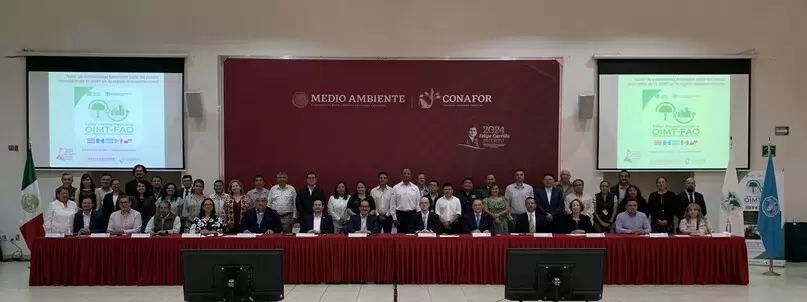ZAPOPAN, Mexico
,
March 22, 2024
(press release)
–
Opening of the ITTO–FAO Meso-American workshop on Forest Products Statistics hosted by CONAFOR. Photo: R. Canales/CONAFOR A workshop convened by ITTO, the Food and Agriculture Organization of the United Nations (FAO) and Mexico’s National Forestry Agency (CONAFOR) this week has helped increase capacity in forest product statistics and reporting in five countries in Mesoamerica. The FAO–ITTO Workshop on Forest Products Statistics in Mesoamerica, which took place on 19–21 March 2024, was attended by 43 forest specialists, technicians, statisticians and academics of five Mesoamerican countries—Costa Rica, Guatemala, Honduras, Mexico and Panama. Its aims were to strengthen statistical capacity in the region; increase the response rate to the Joint Forest Sector Questionnaire (JFSQ), which is a key tool by which international organizations gather data on wood production and trade from countries; strengthen contacts in the region, particularly in countries that have not submitted JFSQs recently; increase collaboration among countries in the region; and address other issues related to statistical data and definitions. In a video message addressed to workshop participants, Mexico’s Minister of Environment and Natural Resources, María Luisa Albores González, highlighted the government’s acknowledgment of the interdependence of humans and the environment, striving towards a prosperous and just society. “Mexico’s policy on natural resources, which was crafted in consultation with forest communities, is based on the principle of producing by conserving and conserving by producing,” she said. “Forest statistics provide a clear picture of the status of our forests and are vital for crafting policies and strategies relevant to the reality of our forests for their sustainable management.” CONAFOR Director General, Luis Meneses Murillo, said the workshop was designed to address fundamental issues with a view to improving the quality and availability of statistical data in the forest sectors of the participating countries. At the end of the workshop he thanked participants for their willingness to share their knowledge, experiences and best practices on forestry statistics. “The diversity of perspectives and collaboration between our countries is key to building a sustainable future for our entire region,” he said. “We reaffirm CONAFOR’s commitment to continue working in close collaboration with all actors involved in forest management, both nationally and internationally.” Mr Murillo also noted the recent launch of Mexico’s National Forest Information System, which provides indicators and data on the country’s forest sector. ITTO statistician Jean-Christophe Claudon, who helped guide the workshop, said good data are crucial for environmental protection, economic development and climate-change mitigation. “The forest sector will play a critical role in future environmental and economic decisions,” he said. “We must support it by providing the best data possible to stakeholders, politicians and governmental bodies in order to ensure that the future decisions which will affect the forest sector are wise.” FAO Forestry Officer, Arvydas Lebedys, said the capacity development offered by the workshop would contribute to the further development of forest product statistics in the Mesoamerican region. The region is a net importer of primary forest products, with imports of USD 11 billion in 2022 far exceeding exports (USD 1 billion). “Forestry statistics have become increasingly important, especially at a time when policymakers in the world require timely and reliable information for decision-making,” said Mr Lebedys. Workshop participants discussed the roles of the main actors in the collection and dissemination of international statistics on forest products. They made presentations describing the forest sectors in their countries, the existing systems for collecting, analysing and disseminating forest product statistics, the methodologies used, the role of forest products statistics in national policymaking, and suggestions for improving data collection and reporting. Topics and comments raised in the question-and-answer session included the reliability of trade data; the ITTO/FAO handling of non-submissions of the questionnaire; collaboration and liaison between domestic agencies in reporting countries that collect data; the reporting of wood pallets in international trade; dealing with broken time series; and the possibility of interacting through regular online meetings. Discussions on the revision of production of primary wood products time series were undertaken, with participating countries highlighting potential discrepancies between the reporting of international organizations and those of participating countries. Roundwood balances and negative domestic consumption, which are common problems in forest products reporting, were also presented and corrected. The workshop strengthened the communication between reporting countries and ITTO and FAO. Participants also received a briefing on timber conversion factors, with a focus on the work that ITTO has done to improve the accuracy of conversion factors used in the tropical wood products trade data, as set out in the publications, Forest products conversion factors: tropical logs and sawnwood, published by ITTO, andForest product conversion factors, published jointly by ITTO, FAO and UNECE in 2020. ITTO has developed weight/volume conversion factors for tropical logs and sawnwood by species and by country, based on known data on wood densities and wood moisture relationships, and the traded volume of the main reported species by country, but limited data are available for countries in the Mesoamerican region. Statistical correspondents were urged to complete the ITTO-2 Trade in Tropical Timber Species section of the JFSQ to enable the development of more accurate weight/volume conversion factors for countries in the region. Download workshop’s presentations below.
* All content is copyrighted by Industry Intelligence, or the original respective author or source. You may not recirculate, redistrubte or publish the analysis and presentation included in the service without Industry Intelligence's prior written consent. Please review our terms of use.




